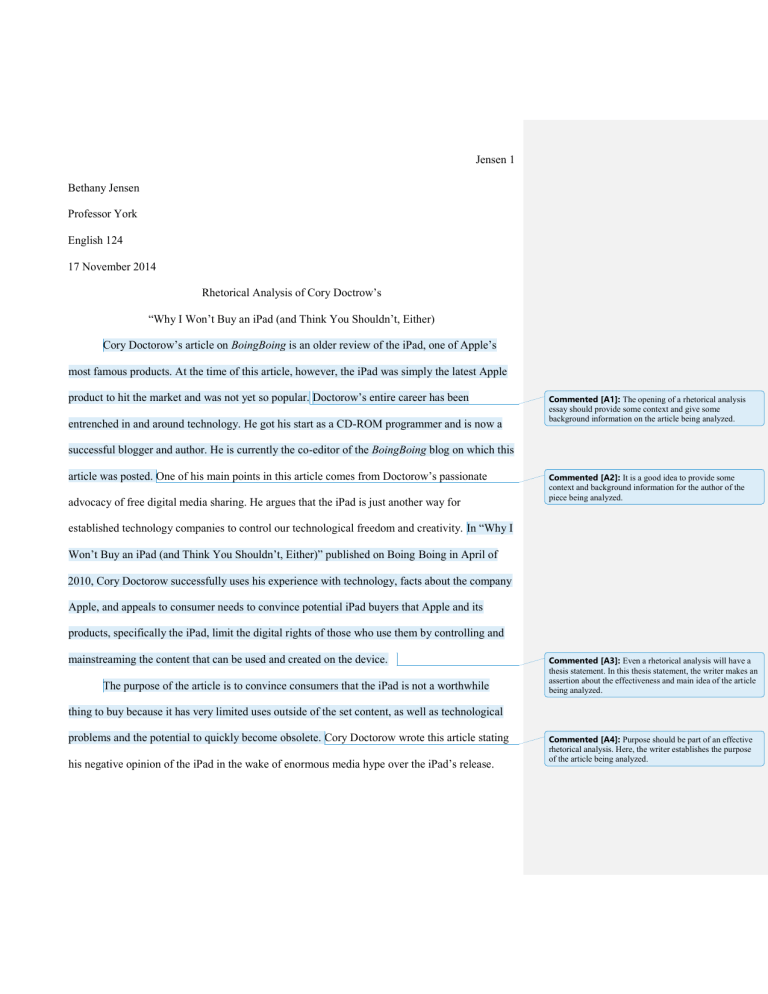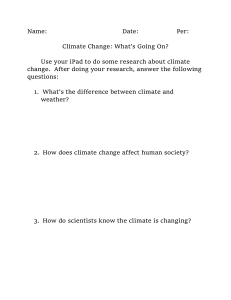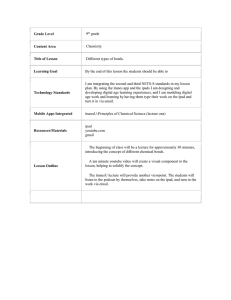
Jensen 1 Bethany Jensen Professor York English 124 17 November 2014 Rhetorical Analysis of Cory Doctrow’s “Why I Won’t Buy an iPad (and Think You Shouldn’t, Either) Cory Doctorow’s article on BoingBoing is an older review of the iPad, one of Apple’s most famous products. At the time of this article, however, the iPad was simply the latest Apple product to hit the market and was not yet so popular. Doctorow’s entire career has been entrenched in and around technology. He got his start as a CD-ROM programmer and is now a Commented [A1]: The opening of a rhetorical analysis essay should provide some context and give some background information on the article being analyzed. successful blogger and author. He is currently the co-editor of the BoingBoing blog on which this article was posted. One of his main points in this article comes from Doctorow’s passionate advocacy of free digital media sharing. He argues that the iPad is just another way for Commented [A2]: It is a good idea to provide some context and background information for the author of the piece being analyzed. established technology companies to control our technological freedom and creativity. In “Why I Won’t Buy an iPad (and Think You Shouldn’t, Either)” published on Boing Boing in April of 2010, Cory Doctorow successfully uses his experience with technology, facts about the company Apple, and appeals to consumer needs to convince potential iPad buyers that Apple and its products, specifically the iPad, limit the digital rights of those who use them by controlling and mainstreaming the content that can be used and created on the device. The purpose of the article is to convince consumers that the iPad is not a worthwhile Commented [A3]: Even a rhetorical analysis will have a thesis statement. In this thesis statement, the writer makes an assertion about the effectiveness and main idea of the article being analyzed. thing to buy because it has very limited uses outside of the set content, as well as technological problems and the potential to quickly become obsolete. Cory Doctorow wrote this article stating his negative opinion of the iPad in the wake of enormous media hype over the iPad’s release. Commented [A4]: Purpose should be part of an effective rhetorical analysis. Here, the writer establishes the purpose of the article being analyzed. Jensen 2 Apple has proclaimed the iPad as a technological revolution, but Doctorow disagrees. He made this statement in response to Apple’s policies, exemplified by the iPad; “of course I believe in a market where competition can take place without bending my knee to a company that has erected a drawbridge between me and my customers!” (3). He is out to convince his audience they deserve the right to be responsible for their own media sharing and content. One example of Doctorow’s position is his comparison of Apple’s iStore to Wal-Mart. This is an appeal to the consumer’s logic—or an appeal to logos. Doctorow wants the reader to take his comparison and consider how an all-powerful corporation like the iStore will affect them. An iPad will only allow for apps and programs purchased through the iStore to be run on it; therefore, a customer must not only purchase an iPad but also any programs he or she wishes to use. Customers cannot create their own programs or modify the hardware in any way. Doctorow has a very clear opinion of this. He says, “as an adult, I want to be able to Commented [A5]: In a rhetorical analysis, the writer should emphasize appeals to ethos, pathos, and logos. However, it is not enough to simply list them. Here the writer explains how this example is an appeal to logos. choose whose stuff I buy and whom I trust to evaluate that stuff. I don’t want my universe of apps constrained to the stuff that the Cupertino Politburo decides to allow for its platform” (3). By referencing the constricting forces of communist Russia, the author appeals to his readers’ emotions and a basic human fear of being controlled. This is an appeal to pathos, and it stirs up a natural rebellion against being told what to do. Big corporations want consumers to believe that if they give up their creativity, their lives will be better. In that way, it is like Wal-Mart. “Save money, live better,” just do not think outside of the box. Doctorow appeals to logos again by quoting technology guru William Gibson’s comparison of iPad consumers to a mutant creature. The author also builds his character, an appeal to ethos, here by quoting a renowned expert, one who actually coined the term “virtual reality.” By referring to the specialist’s opinion, Doctorow is acknowledging his need for Commented [A6]: Here, the writer describes an appeal to pathos and explains with specific references to the article being analyzed. Jensen 3 additional counsel. Doctorow reinforces his ethos by building on the solid foundation of an established technological leader. Commented [A7]: Here, the writer describes the appeal to ethos and, again, makes clear connections to the author of the article and the article itself. Doctorow makes another appeal to logos in the form of showing potential iPad buyers what they could have instead of the dictated usage and expensive content that come with the iPad. He argues that consumers do not have to settle for limit digital rights, we have other options. He declares, “the reason people have stopped paying for a lot of ‘content’ isn’t just that they can get it for free, though: it’s that they can get lots of competing stuff for free, too” (4). This is an example of how Doctorow uses reason and logic to make his point. He essentially says, “you could have this one thing…or you could have all of these things.” Why pay for an expensive iPad and monitored apps, when you can get equal or better products and programs for free? The article “Why I won’t buy and iPad (and Think You Shouldn’t, Either)” does have a few flaws. One example of a weakness is Doctorow’s obvious bias against big corporations and digital rights management. He is a software creator, and so he has something personal to gain from free digital media sharing. He displays this bias by giving a rather one-sided argument. He says, “it [Apple] uses DRM to control what can run on your devices, which means that Apple’s customers can’t take their ‘iContent’ with them to competing devices, and Apple developers can’t sell on their own terms” (3). The problem is that not everyone can develop software, and, therefore, not everyone cares. The iPad could be a great piece of equipment with excellent applications for people who are not looking to develop and sell their own software. Just because the iPad does not work for Doctorow, does not mean it will not work for anyone else. In addition to having an agenda, Doctorow does not mention any of the iPad’s positive qualities and abilities. His only positive mention of the iPad states “clearly there’s a lot of Commented [A8]: Near the end of the rhetorical analysis, the writer addresses flaws in the argument and the writing. In a rhetorical analysis, a writer doesn’t share whether or not he or she agrees with the content. Instead, the writer focuses on analyzing the effectiveness of the rhetorical choices in the piece. Jensen 4 thoughtfulness and smarts that went into the design” (2). In reality, the iPad has a lot of cool features, and it can do some incredible things; for example, nearly every big company has an app that represents it, and the internet browsing on the iPad is top notch. Doctorow could have built his up his ethos by being a bit more fair-minded about the benefits of owning the iPad. Overall, Doctorow makes a good argument about why there are potentially many better things to drop a great deal of money on instead of the iPad. He gives some valuable information and facts that consumers should take into consideration before going out to purchase the new device. He clearly uses rhetorical tools to help make his case, and, overall, he is effective as a writer, even if, ultimately, he was ineffective in convincing the world not to buy an iPad. Commented [A9]: As the writer concludes, she refers back to the main point of the rhetorical analysis. Jensen 5 Work Cited Doctorow, Cory. “Why I Won’t Buy an iPad (and Think You Shouldn’t, Either).” BoingBoing. 2 Apr. 2010. Web. 10 November 2014.



